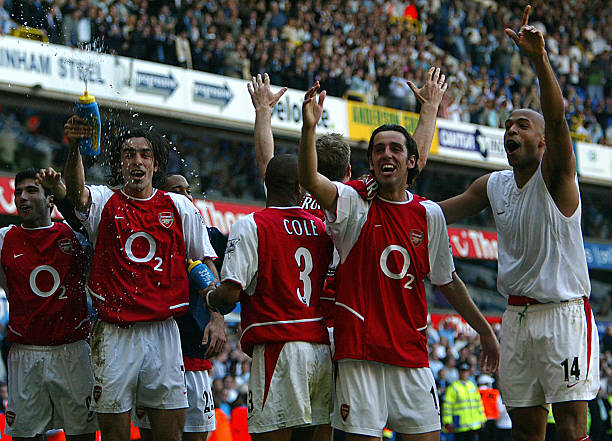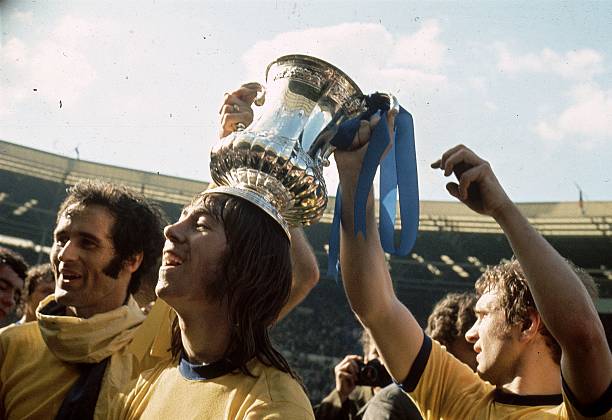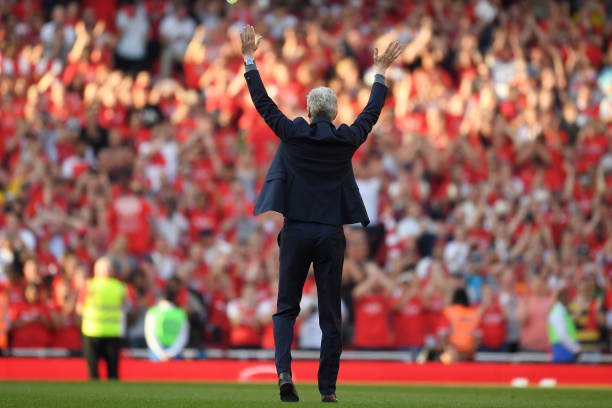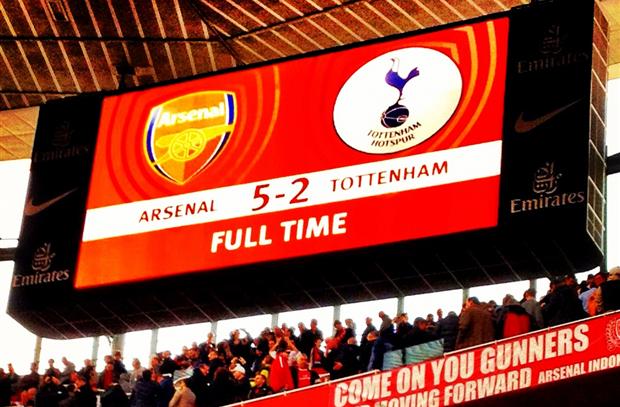As of 5th of this month, I have survived 42 years on this planet, which involves quite a lot of football, and with neither Spurs nor (of course) Arsenal being relegated in that time, there is a lot of history with our noisy neighbours.

Sadly, having had no allegiance until New Years Day 1988 (I’ve touched on that in my Anfield ’89 article), I didn’t experience the joy of Ian Allinson(!) and David Rocastle winning the League Cup Semi-Final at WHL, but, on the flip side I didn’t have to experience finishing below Spurs every other year and watching their annual FA Cup and UEFA Cup runs while we toiled. By the time I had my damascene conversion, Arsenal’s star was on the rise, and for the most part, Spurs’ was just starting to wane (the odd blip aside).
Because of that lack of history and previous independence, it took me a long time to learn to hate Spurs. I only really got the hang of it after years of Spurs fans hating me (and occasionally beating me up at school).
I was aware of the rivalry, and realised that they two teams had been genuine competitors for much of the 80s, but hadn’t really experienced it. As such, I didn’t really take much notice of their fortunes, and didn’t revel in their failures, a situation aided by their largely being irrelevant for much of the 1990s, with one notable exception.
The 1991 FA Cup Semi-Final: 14th April 1991 – Tottenham 3 Arsenal 1
This one hurt.
Arsenal were by some distance the best team in the country in the 1990-91 season. Despite a small summer transfer profit, which saw Seaman, Limpar and Linighan arrive and Lukic, Hayes, Richardson and Marwood leave, Arsenal remained unbeaten until February, where a team missing three central defenders lost by one goal at Chelsea.
They promptly picked up where they left off and stormed the rest of the league season unbeaten, bolstered by Tony Adams return from residing at her majesty’s pleasure (“who’s that driving on the pavement, who’s that crashing through the wall…”).
Neither points deductions nor an imprisoned captain could stop Arsenal’s relentless results.
Spurs had been tricky opponents in the league with two nil-nil draws (though Arsenal should have won the home game, they owed Seaman a huge debt for avoiding defeat at the Lane, as the mustachioed Yorkshireman saved his team’s bacon several times) showing that, as ever, they were rather more up for playing Arsenal than most other opponents.
However, coming into the Semi-Final, which was the first staged at Wembley – to help the fans of both teams – Arsenal were unbeaten in 13 games, with nine wins and four draws (including two of the three replays of the epic FA Cup 4th Round tie against Leeds United).
In the same time Spurs had only beaten Southampton in the League and Portsmouth and Notts County in the cup, all narrowly, and had lost three and drawn five, and were plodding towards a 10th place finish.
Arsenal were the better team, the in-form team and were the clear favourites.
With the other semi-final between a Nottingham Forest team (despite an emerging Roy Keane) destined for mid-table mediocrity and West Ham preoccupied with chasing promotion to the top flight, Arsenal fans could see the probability of repeating the double, 20 years after Charlie George’s day in the sun.

With a raucous atmosphere and frenetic pace right from the kick-off it was Tottenham who started the brighter, employing a very deliberate tactic to run with the ball at the Arsenal backline, and with Gazza pumped up in a way many hadn’t seen since the previous year’s World Cup. Spurs’ rotational five-man midfield, hardly an innovation these days, caught Arsenal on the hop, and gave Spurs early control.
Less than five minutes in, Spurs won a very soft (watch the replay – almost impossible to see what it’s for) free-kick about 40 yards out, pretty centrally positioned. Thomas and Davis formed a two-man wall so Seaman could get a clear sight of the ball, and Gazza promptly thumped it into the top left corner of the Arsenal goal. Seaman got a hand to it, and probably should have saved it, particularly given the extraordinary form he had been in all season, but as we discovered over the years facing ridiculously ambitious long shots was always a chink in Spunky’s otherwise impressive armour.
Only five minutes later, Spurs doubled their lead. A rather more genuine free-kick started the Spurs move, and excellent combination play between Gascoigne and Allen (cynically denied 11 years before by Willie Young) on the Spurs right was aided by appalling positional play by Nigel Winterburn. This left Steve Bould exposed in the left back role with a 2 on 1 to deal with, which was never a good thing, and Allen whipped a cross in. Although Dixon had ably covered Howells, the ball bounced off the hip of Smith, who had been covering Mabbutt, and dropped to Lineker 6 yards out with half the goal to aim at. Two-nil, and all us Gooners were shell-shocked
Not long after Smith scooped over from a low cross on his right foot, but despite pressing Arsenal didn’t create anything of note until Smith brilliantly headed in from a Dixon cross from deep, right on half-time. Game on!
Come the second half, Arsenal totally dominated proceedings coming close or close-ish on a few occasions, but a final individual run from Lineker wide of Adams culminated in a sharp shot that Seaman tragically let through both his hands into the corner of the net. Three-one. It was the 78th minute and only the third time Spurs had had possession in the Arsenal penalty area in the second half.
While the game was largely up, people forget that Campbell hit the bar and Merson and Campbell again came very close to scoring in the last 10 minutes, where Spurs were offering nothing, bar one run from Paul Walsh. What I had forgotten until re-watching for this article, is how Venables had got his team rotationally tactical fouling long before it was in vogue, and what an absolute snide shithouser Nayim was coming of the bench.
As those of similar vintage to myself or older will remember, Spurs won the Final against an injury diminished Forest, 2-1. Gazza, even more pumped up than in the semi, sustained the injury that would prevent his career reaching the heights it should have in committing a terrible foul on Gary Charles, that should have seen him sent off. As in the semi-final, Spurs had the best passages of play despite an uneven performance and Mabbutt forcing Des Walker into an extra-time own goal was a nice moment for him following his extra-time own goal for Coventry City’s shock Cup Final win in 1987.
For those Arsenal fans finding this re-cap painful, there is some solace, and a sting in the tail for gloating Spurs fans, as the end of the season saw Manager Terry Venables move upstairs, after which things unravelled quickly.
Bar the two appalling league campaigns in 92-93 (soften by two cup final wins, including beating Spurs in the semi-final in the FA Cup) and 94-95 (not helped by Nayim’s fluke in the 120th minute of the Cup-Winners Cup final), where Spurs were also thoroughly average, Arsenal would totally dominate the rivalry for the next 26 years.
Even now, since then, Spurs have won a grand total of two League Cup finals, whereas Arsenal have totted up one league cup, three league titles and eight more FA Cup wins. Indeed, despite the balance redressing over the past 5 years, Tottenham have a grand total of five seasons in the Champion’s League / European Cup in their history. Arsenal have had 20 since that day at Wembley in April 1991.
For me there is one game that encapsulates this period of comfortable dominance more than any other. And it doesn’t involve winning the league at White Hart Lane.
Saturday, 13 November, 2004 Tottenham 4 Arsenal 5
On the face of it, this is hardly Arsenal’s most dominant, significant nor blood stirring victory over Spurs since I started taking an interest in 1988.
In a way, that is what for me makes it so special. A narrow victory away at your local rivals in a nine-goal thriller should be a heart beating, nerve shredding emotional roller coaster. In this case it was pure entertainment, where victory never seemed in doubt despite falling a goal behind and defending like amateurs.
Coming into the game, Arsenal had only gained two points out of the last three games, the first of which was the heart-breaking trip to Old Trafford to end the unbeaten run at 49 games, in which Mike Riley gave the most disgustingly biased refereeing performance I’ve ever seen. That’s Mike Riley, current head of English referees…
Prior to that defeat, Arsenal had won eight and drawn once, starting the season in imperious form and had still only lost once in 52 league games, although they had stuttered a little in Europe, and would finish runners up and with another FA Cup for the trophy cabinet.
Spurs had finished the previous season 14th and, despite a decent start to the season had lost five out their last six coming into this fixture. No one gave them a chance, beyond the punchers’ one that always exists in local derbies. But Arsenal hadn’t won at White Hart Lane since spring 1999, and were clearly reeling from the end of their armour of invincibility, so the collective chin was a little glassier than normal.
Added to the sub-plot was the fact that a certain Sulzeer Jeremiah Campbell was missing with injury, saving him from another barrage of abuse and effigies, with further absentees resulting in Pascal Cygan being thrust into the uncomfortable limelight, and the game poised to be a test for 17-year old Cesc Fabregas, deputising for Gilberto Silva.
As ever, White Hart Lane was lively, and Defoe and Keane’s early running into the channels exposed Cygan’s lack of mobility, and Fabregas was being targeted for physical stuff in the centre of midfield, with Michael Brown providing his usual mix of late tackles and off the ball body checks. Honours were largely even in the first quarter, though Spurs had the better openings. Then, largely out of nowhere, from a free-kick Moroccan centre-half Noureddine Naybet found himself unmarked at the back post when the ball fell to him in the 37th minute and Spurs were ahead, with his first goal for the club being a particularly popular one with their fans. A minute later, Defoe had a header was excellently tipped over by Lehmann, and Spurs appeared to be in the ascendancy.
Then Arsenal woke up.
As the team started playing with a bit more purpose, right on the stroke of half-time Lauren floated a diagonal ball between Ledley King and Paul Robinson, and Thierry Henry stole in, wrong footed King and stabbed it past Robinson. His eleventh of the season. One-all and normal service resumed.
Once the second half was underway, Arsenal addressed the game with renewed determination and vigour, and Spurs couldn’t get out. Fresh from fouling Reyes out wide, Noe Pamarot was beaten on the outside by Ljunberg and rugby tackled him in the box as he fell. Lauren, with the cold dead eyes of a killer stuck the penalty in the bottom left corner as Robinson went the other way, and ran towards the Arsenal fans with an iconic mania, before a disgruntled Spurs steward intervened. On the replay, you can see Robinson punt the ball straight into Fabregas’s head as the Spaniard goes off to join the celebrations.
Four minutes later, Vieira won the ball centrally with a strong clean tackle, broke through two other challenges and firmly planted the ball past Robinson in his trademark way.
Spurs 1 Arsenal 3. Game over.
Except it wasn’t. Almost immediately from the kick off Defoe beat two men, accelerated into the box past another couple and toe poked the ball into the top corner from nearly 18 yards out. A BRILLIANT individual goal out of absolutely nothing. However, Arsenal quickly asserted themselves again, with Pires coming on for Reyes and drifting into central areas to outnumber the Tottenham midfield. Within a few minutes, a flowing move between Fabregas, Pires and Bergkamp broke down, but the 17-year-old Spaniard won the ball back, took a short pass from Pires and slid a delicious reverse ball to a left sided Ljungberg, who finished with his usual assurance.
And still Spurs came back. Three minutes later, Defoe was fouled out left, Carrick whipped it in and Cygan completely lost Ledley King who planted his header past an oddly positioned Lehamnn. The home fans believed a famous come-back was on, but within five minutes, despite being denied by a great block, Henry kept his composure and found Pires out left, who soft shoe shuffled past his man and slid the ball under Robinson to restore the two-goal cushion.
Still the scoring continued, with Henry just before the end giving the ball away cheaply in midfield, totally exposing his defence, and Kanoute finishing excellently after a crossfield chip to him by Edman. The last few minutes saw a little huffing and puffing and aerial bombardment by Spurs but it finished 5-4.
Make no mistake, this was a million miles from a vintage Arsenal performance, and defensively both teams deserved to lose. But what it was, was a clear demonstration that Arsenal, even with the confidence rocked, their defensive rocks absent and terribly careless at times, were just too good for the Spurs team of the day. Why this was didn’t take too much analysis. Apart from perhaps slotting Ledley King into Arsenal’s makeshift defence, and with appreciative acknowledgement of Carrick, Keane and Defoe as excellent footballers, there was no comparison between the quality of players on either side. Not one of Spurs’ players would have made Arsenal’s best eleven, and a number wouldn’t have made Arsenal’s reserves either.
As was demonstrated on the day, in the early to mid-2000s, Arsenal were simply miles ahead of Spurs as a team and a club, and even the chaos of this nine-goal thriller didn’t at any point lead anyone to question this inherent superiority. Even after the match, Spurs giving Arsenal a close game was seen as a success by many reports. At this stage the rivalry was purely geographical.
All good things come to an end

If we fast forward to today, we see how things have changed.
Just as in 1991 no-one could have foreseen the gap between Arsenal and Spurs in 2004/05, equally it would have been hard to predict Spurs’ slight ascendancy in the last three years from the viewpoint of the mid-2000s.
As Tottenham’s fortunes were characterised by poor coaching, bad transfer business and petty boardroom squabbles in the years following their last FA Cup win, so Arsenal, at different times, have experienced elements of all three since the Invincibles team started to break up.
At the moment, there is comparative parity, with Spurs’ team appearing to have peaked, and Arsenal trying to re-find their identity with limited spending money.
The same applies off the field, with Spurs having caught up commercially.
As in 1991, Arsenal remain the bigger club, with a trophy haul more than double that of ‘that lot down the Seven Sisters Road’, and greater global appeal, but the rivalry is certainly true once again. It’s more than just schadenfreude that keeps us interested in the other’s results.
Last year, only a referee’s inability to understand the offside law in the second NLD of 18-19 gave Spurs the chance to finally experience that Arsenal staple of being thrashed by Bayern in the Champion’s League, at Arsenal’s expense.
Even this year, as our season was cut short, Spurs were one point ahead of Arsenal, the Gunners with a game in hand.
Obviously, current events leave us uncertain what the future means for us as individuals and resumption of football, but as things stand the North London Derby has as much resonance for both sets of fans as it has at any time of my in earnest football supporting life.
And much though that causes me some discomfort from time to time, its probably a good thing!

